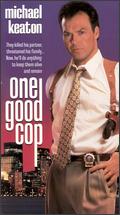One Good Cop
 for violence, language and drug content.
for violence, language and drug content.
Reviewed by: Brett Willis
CONTRIBUTOR
| Moral Rating: | Very Offensive |
| Moviemaking Quality: |
|
| Primary Audience: | Mature-Teens Adults |
| Genre: | Crime Drama |
| Length: | 1 hr. 45 min. |
| Year of Release: | 1991 |
| USA Release: |

| Featuring |
|---|
| Michael Keaton, Rene Russo, Anthony LaPaglia, Kevin Conway, Rachel Ticotin, Tony Plana, Benjamin Bratt, Grace Johnston, Rhea Silver-Smith, Blair Swanson |
| Director |
|
Heywood Gould |
| Producer |
| Laurence Mark, Harry Colomby |
| Distributor |
| Hollywood Pictures |
This is a split-personality film. Its gritty treatment of the Cop vs. Drug Dealer theme is just average, with some plot holes and a farfetched ending. There’s also a parallel storyline of an infertile couple struggling to adopt. And these two themes are tied together by an overworn Robin Hood/Zorro device. But I think the family scenes themselves, and the handling of the childless issue, are excellent.
NYPD cops Artie Lewis (Michael Keaton) and Steve Diroma (Anthony LaPaglia) make a living by busting bad guys and getting their own noses broken. Lately, the streets have been more dangerous than usual because a lot of the lowlifes are smoking “Ice.” At home, both families are incomplete. Artie and his wife Rita (Rene Russo) can’t have children. Steve’s wife is deceased and he’s raising three beautiful little girls alone.
When Steve is killed in the line of duty by a guy who’s whacked out on Ice, Steve’s will makes Artie the guardian of his kids. Artie wants to “repay” the high-level dealer who put the Ice on the street. And, in order to keep the girls permanently and get Social Services off his back, he needs the down payment for a decent-sized house. Now, how could he kill two birds with one stone? Duhhh.
Content Warnings
Violence is extreme in spots with Artie, Steve, Artie’s new partner Felix (Benjamin Bratt) and an undercover cop (identity withheld) doing hand-to-hand combat with all kinds of crooks. And there’s a scene of a man high on Ice taking his own wife and children hostage. Several on-screen deaths. Profanity is also extreme in spots, with plenty of f* and other colorful language. Sexual content is limited to implied situations, some suggestive dancing at a Latin nightclub, and a few attempts at lovemaking by Artie and Rita which get interrupted early now that they’ve become parents (one of these is played for laughs, and involves fibbing to the kids about what they were doing). There’s no nudity.
Food for Thought
The issue of honest cop Artie being pressured by circumstances to step over the line. Whether it’s someone engaging in vigilante justice while regular law enforcement is operative, or unmarried teens trying to get hold of contraceptives, “there’s no way to do wrong right.” Artie eventually takes responsibility for his actions and faces the music, but external events create a fairy-tale ending and let him off easy. So the film sends a mixed message on that issue.
More food for Thought: The drug dealer, Beniamino Ríos (Tony Plana), is portrayed as a heartless scumbag. But remember that Hispanic culture views drug abuse as a “user problem” (”we wouldn’t ship it if your out-of control kids weren’t buying it”) whereas Anglo culture views it as a “supplier problem.” Which one is the Biblical view? We must infer an answer to that from the Bible’s treatment of similar activities. Regarding alcohol abuse, there are warnings to both users (Prov. 23:29-35) and suppliers (Hab. 2:15). And on the issue of idol worship, Exodus 20:4-6 forbids both the manufacture and the use of idols. So I doubt that drug abuse is an “either-or” issue. I think it’s fair to say that both dealers and users will have a lot to answer for, unless they find forgiveness in Jesus.
The entire film has high production values and excellent acting. The “family” scenes of Artie and Rita adjusting to being instant parents are true-to-life (I’m a foster and adoptive parent) and are alternately touching and hilarious. Grace Johnston, Rhea Silver-Smith and Blair Swanson do super jobs as the Diroma girls. The oldest, Marian (Johnston), is already hardened to the world at age 7 or so, and realistically portrays grief and anger over losing her parents. The middle girl, Barbara (Silver-Smith), age 5, is convincing as a two-injection-a-day diabetic. There are glimpses of the overcrowded Social Services system, and of issues like splitting up families because foster and adoptive parents don’t want more than one child and don’t want to deal with medical problems.
I don’t recommend the whole film, but I highly recommend the family section. The difficulty of course is that “action” fans will be disappointed because the film is not purely one genre, and many viewers interested in the “family” aspect will not care to wade through the R-rated violence. I don’t know the right answer for every household; I merely point out the problem. Our own solution was: My wife got up and did something else during the action scenes and just had me call her back for the family segments.


My Ratings: [Better than Average / 5]